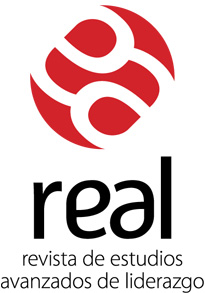 |
Volume 1, Number 1
| January - June 2012
From the Editor It is with great pride and satisfaction that I introduce the inaugural issue of the Revista de Estudios Avanzados de Liderazgo (REAL), which is filled with great articles. Our vision is to be the principal means of publication of the analyses, reflections, new concepts, and theories that leadership brings to the Spanish-speaking world. While culture definitely influences styles of leadership, little has been explored about Latin American leadership styles and the differences, not only between them, but also between leadership styles in other cultures around the world. In this first issue, we focus on leadership and its relationship to business ventures. With that in mind, these five articles provide valuable contributions to the advancement of the fields of leadership and entrepreneurship. [ continue ] |
|
LEADERSHIP AND ENTREPRENEURSHIP INNOVATION IN NEW TECHNOLOGY-BASED FIRMS: Keywords: Leadership, entrepreneurship, knowledge management, new technology-based firms. Analyzing the relationship between leadership and innovative entrepreneurship from a knowledge management approach, this article examines case studies featuring ten new technology-based firms in the development phase. This qualitative study reveals how the skills of entrepreneurial leaders positively influence the recognition and utilization of business opportunities, guiding employees toward efficient knowledge management that favors innovation development. [ continue ] ‹‹ Top of Page ›› DOES A LEADER NEED POWER? Keywords: Authentic leadership, level 5 leadership, power, authority, emotional intelligence. Power. It can either be dark and evil or a positive force used to achieve individual, group and organizational goals. This article considers the latter and studies, from a reductionist perspective, the power relationships inside corporations. Leadership is an exercise of power (Semler, 2003), and therefore, leaders must develop appropriate organizational power bases to effectively and ethically use their power to influence others. This article contrasts the two concepts of power and leadership, seeking to discover the true relation of both terms in the creation and development of authentic leadership (Wernsing, 2009) and humanist practices in management (Von Kimakowitz et al., 2010). [ continue ] ‹‹ Top of Page ›› ENTREPRENEURIAL COMPETENCIES IN STUDENTS OF PSYCHOEDUCATION AT THE PEDAGOGICAL UNIVERSITY AND TECHNOLOGY OF COLOMBIA (UPTC) Keywords: Skills, entrepreneurship, university, psycho-pedagogy, training. Are the entrepreneurial skills in students of psychopedagogy necessary for their job performance? In response to this question, this article discusses the development of an entrepreneurial skills training process to assist students in developing productive educational projects for their job performance. The three-phase process includes the diagnostic phase to determine the students' enterprise level, the development of training plan, and the actual training, which includes project life, human development, entrepreneurship, and creativity, among others � all in expectations that students will generate education projects according to their interests and preferences as alternative employment. [ continue ] ‹‹ Top of Page ›› ENTREPRENEURSHIP, STRATEGY, AND CHALLENGES: A CASE STUDY ON BODYTECH™ Keywords: Bodytech, Entrepreneurship, Leadership, Strategy. A report published on February 2, 2011, in Portafolio, included a case study on BODYTECH as one of the examples in the "Business Lessons" section, where successful entrepreneurs were invited to share their experiences. BODYTECH has evolved into an unprecedented business success in Colombia by demonstrating sustainable growth since 2002. They now serve more than 90 thousand costumers and have almost 40 locations in both Columbia and Peru. According to BODYTECH's founders, the keys to success include deep market knowledge, improved use of cultural and population trends, and excellent customer service, as well as a number of financial and organizational factors. Since documenting a case of effective entrepreneurship is essential for the formation of new entrepreneurs, the purpose of this article is to study the example set by BODYTECH. [ continue ] ‹‹ Top of Page ›› THE EMOTIONAL INTELLIGENCE OF LATIN AMERICAN LEADERS:
COMPARISON BETWEEN CHILE AND COLOMBIA Keywords: Emotional Intelligence, Chile, Colombia The concept of emotional intelligence as the ability of people to deal with emotions (Salovey & Mayer, 1990; Law, Wong & Song, 2004; Mayer et al, 2000; Wong, Wong & Law, 2007) is gaining recognition in the business environment. A few studies have been made in the United States, Europe and Asia to study this issue. The present study used the instrument developed by Wong and Law (2002) which has been used and approved by various authors. As a result of the validation of the instrument, it can be used in the areas of leadership, management, and organizational behavior (Aslan & Erkus, 2008). According to the results of this study, even though the emotional intelligence�s strengths and weaknesses for Chile and Colombia are very similar, there are still some differences which should be acknowledged. The results suggest significant gender differences within each country, as well. [ continue ] ‹‹ Top of Page ›› |